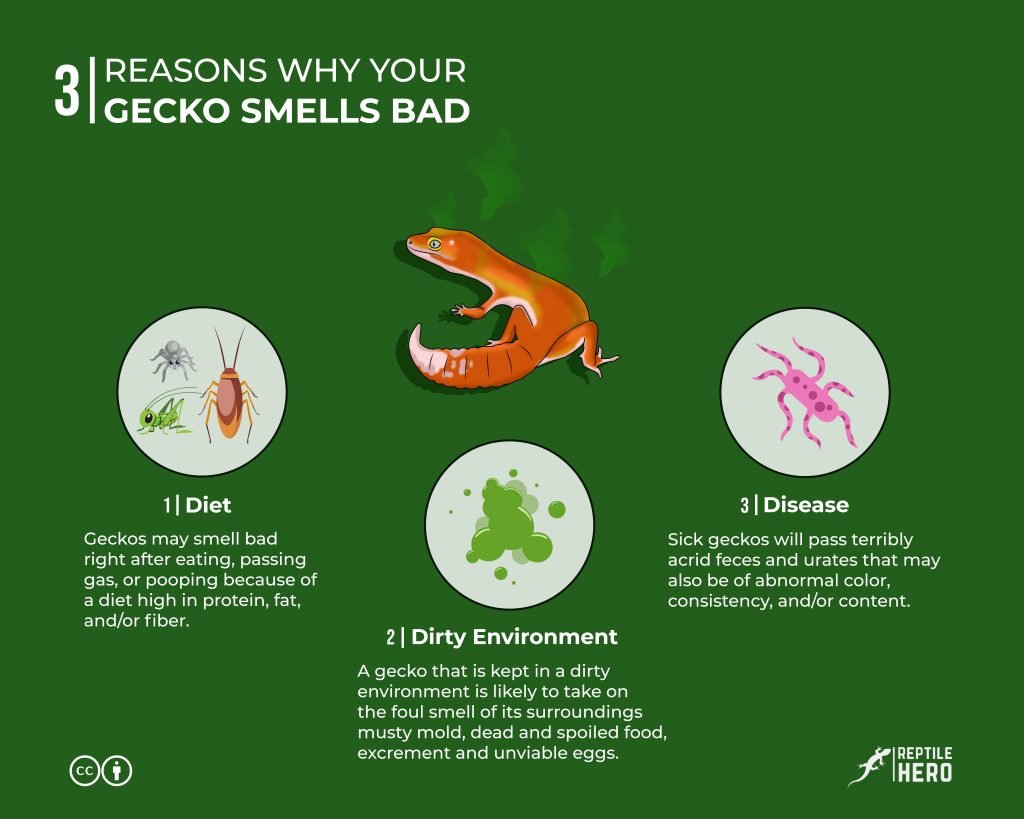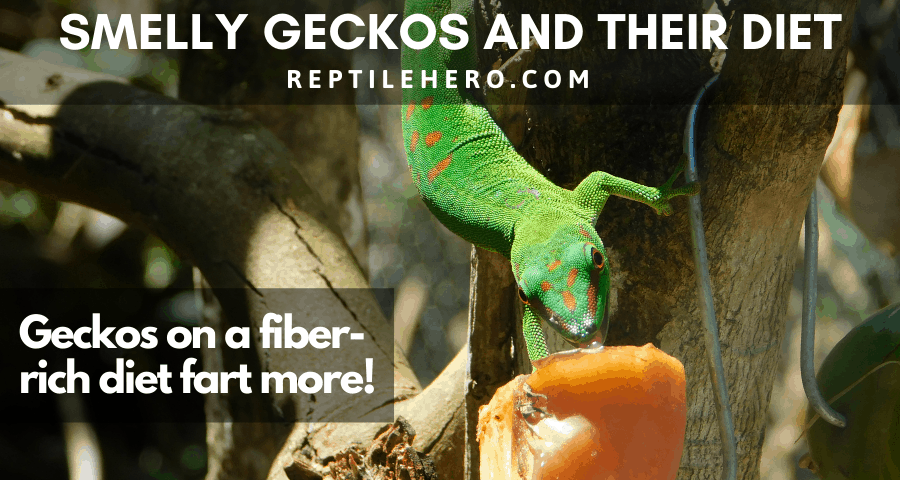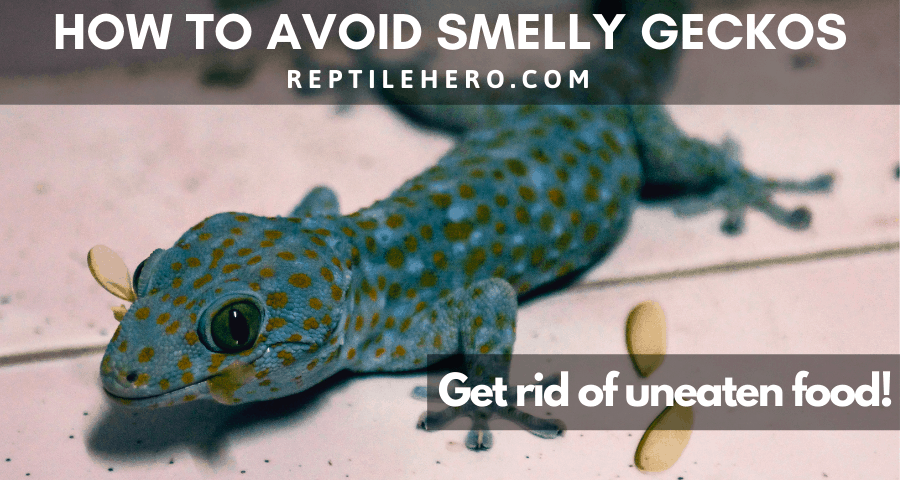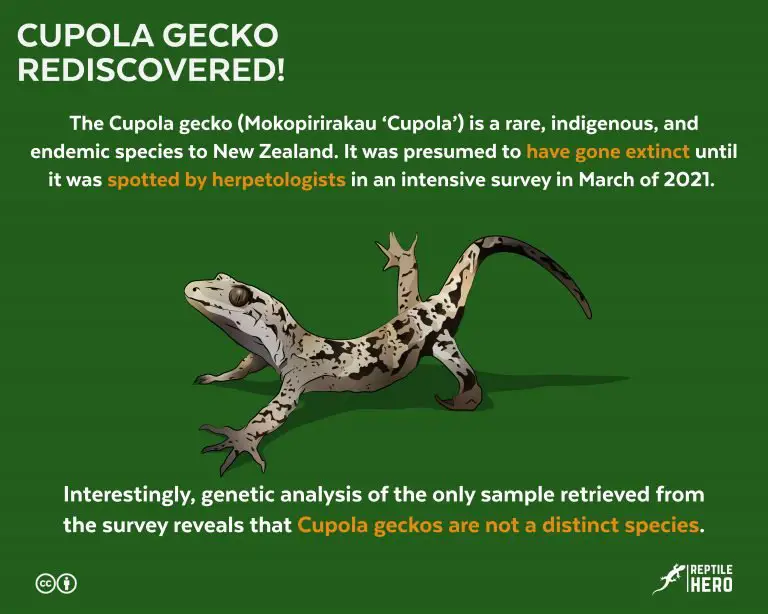3 Reasons Why Your Gecko Smells Bad [and 7 Tips]
Not everything is rainbows and roses when it comes to taking care of our lovely little geckos. As a matter of fact, they can be incredibly stinky! But how could this possibly happen when they aren’t physically built to sweat or even fart – wait, do they?
Geckos do not have inherent body odors. However, factors such as 1) their diet, 2) a dirty environment, and 3) disease cause geckos to have unpleasant scents. To be safe, collect your gecko’s droppings and consult your veterinarian for professional opinion. Also, some species use a stinky liquid to ward off predators.
Sniff out the facts from misconceptions by staying with me until the end of this article!
3 Major Reasons Why You Have Stinky Geckos

Many people not part of the hobby seem to think that reptiles, geckos included, smell bad because they crawl all over the place and don’t really seem to bathe themselves. However, this belief couldn’t be any farther from the actual truth. In fact, most amateur hobbyists find themselves in for a surprise because geckos don’t even smell much of anything at all! There are some exemptions to this rule though, and I’ll be sharing all of them with you.
#1 – Diet
Geckos may smell bad right after eating, passing gas, or pooping because of a diet high in protein, fat, and/or fiber. However, this is normal and will fade away if not caused by other husbandry and health problems.
Unlike the more common furry pets, such as cats and dogs, we can’t exactly brush our gecko’s teeth for them. With this in mind, many of my family and friends are shocked to realize that my little baby doesn’t actually have a bad odor. However, there are still times when you can tell what they just ate from how they smell right after.
Geckos may give off an uncharacteristic displeasing smell when:
- They have food stuck on their body.
- They have just let out gas produced during the breakdown of food.
- They have just dropped their stools and it hasn’t dried up yet or it has become wet due to the tank’s humidity.
The number one culprit most other keepers have pointed out for smelly geckos are crickets. Both insectivorous and frugivorous seem to only give off a noticeable unpleasant smell after eating a meal that’s primarily made up of this nutritious live feeder insect. But why? Well, because crickets are high in protein, fat, and fiber [1].
Protein-rich foods are usually high in amino acids such as methionine and cysteine. These two are collectively termed the sulfur amino acid since they both contain the element. Sulfur is the reason why eggs, turkey, leafy greens, and many other food items have a pungent or rotten stench to them when broken down. Even in small concentrations, we are able to detect it [2]. As such, you may still pick up the scent if they have insect juices on their body, if they have stepped on their food, or if they just finished doing the deed.

Fatty live feeder insects (e.g., waxworms), as well as fruits and vegetables that contain high levels of fiber, also make for smelly geckos. This is because fat and fiber take much longer for their body to process and absorb. Hence, more endogenous – meaning internally produced – gasses build up during digestion, the excess of which will be released through their vents or cloacas. This may be why it’s far more common for frugivorous geckos to fart than insectivorous geckos.
#2 – Dirty Environment
A gecko that is kept in a dirty environment is likely to take on the foul smell of its surroundings – musty mold, dead and spoiled food, excrement (both feces and urates), and unviable eggs.
More often than not, geckos don’t actually smell like anything at all. Since most loving gecko pet parents adorn their babies’ cages with a bunch of accessories – or clutter –for aesthetic purposes as well as to encourage exploration and exercise. Although done with good intentions, a few gecko parents fail to take into consideration that a fully decked-out tank makes for a home that can quickly get dirty and stinky.
Long story short, a stinky vivarium would house a stinky gecko. Don’t get me wrong though, I’m all for reptile enrichment and giving geckos the absolute best enclosure one could ever possibly provide. However, if not cleaned and disinfected regularly, don’t be surprised if foul aromas assault your senses.
Unsanitary gecko vivariums impart revolting stench onto their inhabitants because of the following unhygienic factors in particular:
- Mold growth. When your gecko’s tank has poorly regulated humidity levels resulting in excessive moisture and also lack ventilation, mold is sure to thrive – even on silicone. Decors, tank furnishings, and even substrates made of natural materials such as plant matter and wood are prone to developing mold as they are good food sources for these organisms.
- Dead and/or rotten leftover food. Needless to say, foods that are decaying do not smell pleasant. Many gecko owners have had live feeder insects crawl into the smallest holes and crevices in the tank and die there. They do admit that they usually don’t watch over their geckos during feeding time and so insects that get stuck and die go unnoticed until they start smelling really bad.
- Accumulation of droppings. To reiterate, although it’s perfectly normal for gecko feces and urates to reek right after excretion, it becomes odorless once fully dried out. It only becomes a stinky mess once it all piles up and gets wet because of the humid environment within the enclosure.
- Bad and infertile eggs. I’m all for more naturalistic substrates. However, the problem of finding eggs can be challenging whenever geckos lay them deep into the vivarium’s earth bedding. People who have unknowingly bought and adopted gravid geckos have shared concerns of an incredibly nauseating stench coming from their geckos and tanks. Once told to carefully dig through the substrate, they almost always find a dud that’s all dented, moldy, discolored, leaky, and insanely stinky.
Smelly situations caused by any or all of these factors are easy to deal with. To be completely frank with you, it will take much effort and time to completely remove such odors. However, bad odors produced by molds, foods, droppings, and duds will go away. So don’t worry about getting and setting up a new tank just yet – well, unless you’re only using a plastic bin. Most plastic materials easily retain the scent of what is kept inside them. If you’ve ever kept sauerkraut or kimchi in a plastic storage container, you know what I mean.
Then again, I don’t really recommend the use of plastic storage bins for permanent housing of your pet gecko. Sure, it’s incredibly cheap. But I think the disadvantages outweigh the advantages of this one. If you’re interested as to why keep a lookout for a Reptile Hero article on vivariums. We’re going to publish one very soon.
#3 – Disease
Sick geckos will pass terribly acrid feces and urates that may also be of abnormal color, consistency, and/or content.
If you haven’t changed your baby’s diet up and you always make it a point to keep your gecko’s tank in pristine condition but you can still smell something extremely unpleasant, your gecko might be silently suffering from a disease caused by parasites and other microorganisms.
Although not commonplace nowadays with the strong advocacy of keepers for proper and hygienic husbandry, geckos can still carry bacteria, fungi, viruses, and protozoa among other things. These pathogens will disturb your gecko’s natural intestinal flora which may cause serious digestive and renal issues.
A gecko and its droppings will smell incredibly bad if they are infected by a microbe which is not limited to the following [3]:
- Salmonella
- Clostridium
- Pinworms
- Physaloptera
- Strongyloides
- Giardia
- Coccidia
- Cryptosporidium
But before phoning your veterinarian, make sure your gecko isn’t having smelly farts simply because it went into brumation too soon after a heavy meal. This is the equivalent of hibernation in reptiles and other cold-blooded or ectothermic animals. Because these soft-bodied little animals need heat to properly digest their food, being subjected to cold temperatures will slow down their ability to break down food. Hence, they will produce excessive gut gasses.
Sniff Out Your Gecko’s Smell
Now that you know what makes gecko give off a bad scent, think back to what would describe the smell. Better yet, go to your gecko’s tank right now and inspect him and his vivarium for any scent you can pick up.
By doing so, you can rest your mind at ease because gecko poop smelling a little bad is perfectly normal. You could also give your exotic veterinary doctor a ring and schedule a check-up for your little buddy. As they say, always better safe than sorry – don’t wait for things to get worse before doing anything to solve it.
In the event that you need to go to the clinic or you just want to stay safe on the side of caution, make sure to collect a sample of your gecko’s droppings with a plastic spoon. Place it in a small plastic specimen container. List down all of your behavioral observations as well so you don’t forget anything important while talking with your vet.
If you’re going to need to take your car to get to the vet, make sure your little companion is in a safe and secure temporary tank.
7 Practical Tips to Prevent Your Gecko from Smelling Bad
If your gecko smells bad simply because of his or her diet and/or dirty vivarium, doing the following will help get rid of the nasty stench.
#1 – Help Your Gecko Clean Up
Mist them regularly with natural spring or remineralized filtered water at room temperature (approximately 73°F or 23°C). You could also give them a soak or sauna once a week for 15 minutes.
If they show signs of distress earlier than that, let them out so they don’t associate cleaning with stress and danger or drop their tails.
Some owners with fussy geckos have also tried gently rubbing down their geckos with damp paper towels with great success.
#2 – Clean Your Gecko Tank with a Deodorizing Disinfectant
Don’t wait for your gecko and tank to smell insanely foul before your start cleaning. Ideally, you should do a deep clean for your vivarium at least once a month.
Giving your gecko’s decors, bowls, hides, and the tank itself a good wipe down with a damp cloth won’t do the trick. I suggest using unscented cleaning vinegar so you won’t have to dilute it with water.
If you don’t have that in your local drug store or supermarket, try looking for reptile-safe disinfecting and deodorizing solutions (here on Amazon).
Remember to let everything dry out thoroughly before setting up your clean enclosure again.
#3 – Immediately Get Rid of Droppings
Never let droppings accumulate in your gecko’s tank. Spot clean whenever they are done doing their business. Use a paper towel, plastic spoon, old tea strainer, or a sifting shovel (here on Amazon).
If you’re using some paper towel or newspaper for your little buddy’s substrate, replace it immediately.
#4 – Set up a Gecko Litter Box
I know that not everybody’s a fan of loose substrates so they go for reptile carpet, shelf liners, tile, and the like instead.
However, it can be costly and a hassle to have to constantly disinfect these on a daily basis. If this is true for you, get your gecko a small litter box. I know it sounds weird but I have seen others use it without any problems. Just train your gecko to use it as a potty.
A cheaper alternative would be to just use small squares of toilet paper for quick and easy disposal.
#5 – Make Sure Your Gecko Tank Has Ample Ventilation
Now, this is just common sense but having a single small vent for your gecko’s tank will restrict airflow.
If your tank only has a single ventilation hole, add another one but cover it with a mesh wire so your gecko doesn’t start hatching up ideas of escaping soon. My friend forgot to do it before and it was a nightmare, to say the least.
Consider your gecko vivarium’s placement as well, make sure it has a window or two so it doesn’t get stuffy. Some people also turn on their fans in the lowest setting for maximum ventilation.
#6 – Take Out All Uneaten Live Feeder Insects

I know it could be time-consuming to supervise your gecko while it’s hunting for live feeder insects even without tong-feeding.
However, keeping your eye on your gecko and all the live insects hopping and crawling about would make it easier for you to take out all the uneaten ones.
You could also set up a baby monitor or small camera for your gecko for easy checking.
#7 – Switch to a Bioactive Set-up
One of the many reasons that made breeders and keepers I know permanently switch to a bioactive set-up is the presence of small organisms such as springtails and isopods.
These little critters make up what’s called the clean-up crew or hidden janitors. They break down and consume poop, urate, and leftover food before they accumulate and rot.
Plus, this set-up takes spot cleaning off the list of things you need to do to make sure your gecko is happy, healthy, and not at all smelly.
This set-up gives off a woodsy and nutty scent though. So if you don’t really find that appealing, stick to the other 6 tips I’ve listed beforehand.
Geckos with a Stinky Secret Weapon
Our beloved geckos come in all shapes, sizes – and smelly surprises?
Recently, while exploring all the weird and wonderful creatures we have in the world on the web, I came across an incredibly unique group of geckos. It’s the Strophus genus native to Australia, the land down under. Collectively, they can be referred to with a bunch of nicknames: striped, spiny-tailed, jeweled, or phasmid geckos.
What sets spiny-tailed geckos apart from all the other species we are more familiar with in the reptile-keeping community is their ability to squirt an incredibly stinky secret weapon for self-defense [4]. If you think I’m trying to pull a fast one on you, just watch this clip:
They can shoot this sticky and stinky substance for up to 50 cm from glands that run along the entire length of their tails. If, however, their predator is undeterred, they will start wagging their tails before finally dropping it as a last resort to escape [5].
Takeaways
Though geckos normally have little to no detectable body scent whatsoever, their diet, a dirty environment, or an undetected disease may cause them to smell. Checking in with your vet is always a good idea.
Avoid having geckos that smell bad by helping them clean up, cleaning with a deodorizing disinfectant, spot cleaning droppings, setting up a litter box, providing ample ventilation, removing uneaten food, and/or going for a bioactive vivarium.
Sources
[1] https://onlinelibrary.wiley.com/doi/full/10.1002/zoo.21246
[2] https://academic.oup.com/chemse/article/35/4/279/303370
[3] https://www.msdvetmanual.com/exotic-and-laboratory-animals/reptiles/parasitic-diseases-of-reptiles



![Taking Care of Geckos During Power Outages [Final Guide]](https://www.reptilehero.com/wp-content/uploads/2021/04/Gecko-Care-Power-Outage-768x614.jpg)
![10 Reasons Why Your Gecko Does Not Lay Eggs [with Solutions]](https://www.reptilehero.com/wp-content/uploads/2021/03/Reasons-Why-Gecko-Does-Not-Lay-Egg-Infographic-768x614.jpg)


